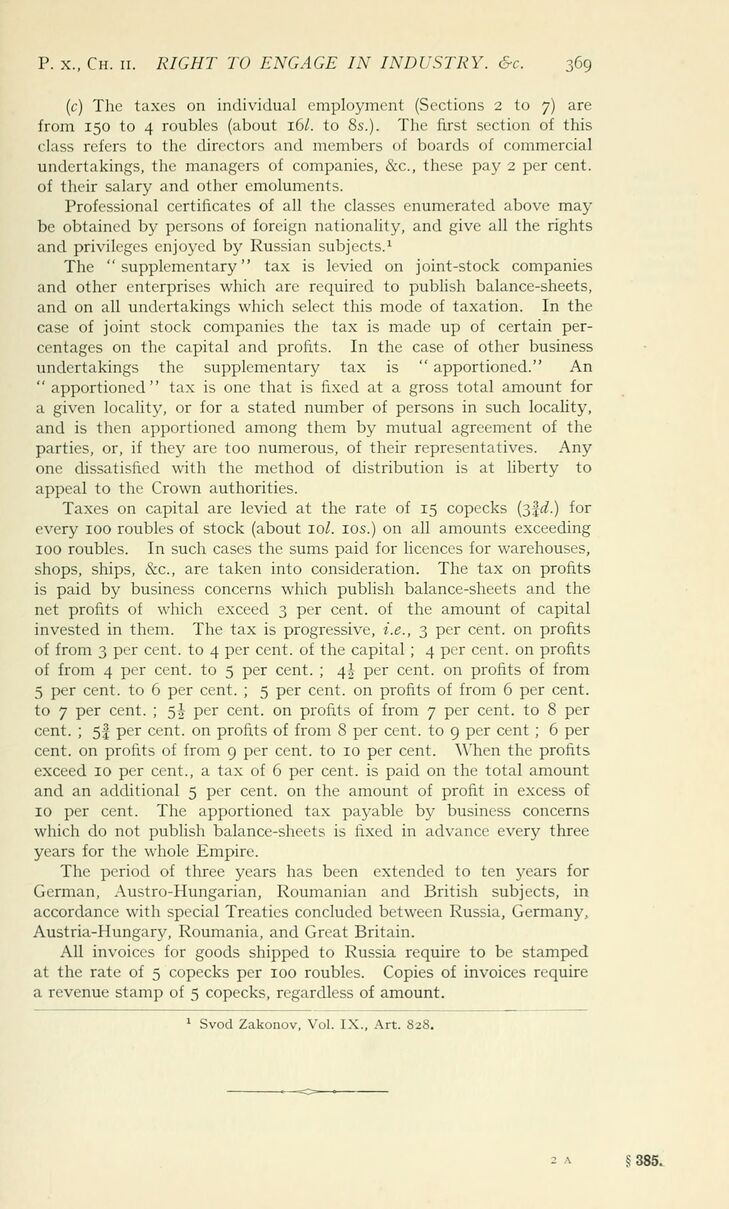
Full resolution (JPEG) - On this page / på denna sida - Pages ...

<< prev. page << föreg. sida << >> nästa sida >> next page >>
Below is the raw OCR text
from the above scanned image.
Do you see an error? Proofread the page now!
Här nedan syns maskintolkade texten från faksimilbilden ovan.
Ser du något fel? Korrekturläs sidan nu!
This page has never been proofread. / Denna sida har aldrig korrekturlästs.
P. x., Сн. II. RIGHT TO ENGAGE IN INDUSTRY. &c. 369
(с) The taxes on individual employment (Sections 2 to 7) are
from 150 to 4 roubles (about 16/. to 8s.). The first section of this
class refers to the directors and members of boards of commercial
undertakings, the managers of companies, &c., these pay 2 per cent,
of their salary and other emoluments.
Professional certificates of all the classes enumerated above may
be obtained by persons of foreign nationality, and give all the rights
and privileges enjoyed by Russian subjects.1
The "supplementary" tax is levied on joint-stock companies
and other enterprises which are required to publish balance-sheets,
and on all undertakings which select this mode of taxation. In the
case of joint stock companies the tax is made up of certain
percentages on the capital and profits. In the case of other business
undertakings the supplementary tax is " apportioned." An
" apportioned" tax is one that is fixed at a gross total amount for
a given locality, or for a stated number of persons in such locality,
and is then apportioned among them by mutual agreement of the
parties, or, if they are too numerous, of their representatives. Any
one dissatisfied with the method of distribution is at liberty to
appeal to the Crown authorities.
Taxes on capital are levied at the rate of 15 copecks (з§d.) for
every 100 roubles of stock (about 10I. 10s.) on all amounts exceeding
100 roubles. In such cases the sums paid for licences for warehouses,
shops, ships, &c., are taken into consideration. The tax on profits
is paid by business concerns which publish balance-sheets and the
net profits of which exceed 3 per cent, of the amount of capital
invested in them. The tax is progressive, i.e., 3 per cent, on profits
of from 3 per cent, to 4 per cent, of the capital ; 4 per cent, on profits
of from 4 per cent, to 5 per cent. ; 4 J per cent, on profits of from
5 per cent, to 6 per cent. ; 5 per cent, on profits of from 6 per cent,
to 7 per cent. ; 5J per cent, on profits of from 7 per cent, to 8 per
cent. ; 5f per cent, on profits of from 8 per cent, to 9 per cent ; 6 per
cent, on profits of from 9 per cent, to 10 per cent. When the profits
exceed 10 per cent., a tax of 6 per cent, is paid on the total amount
and an additional 5 per cent, on the amount of profit in excess of
10 per cent. The apportioned tax payable by business concerns
which do not publish balance-sheets is fixed in advance every three
years for the whole Empire.
The period of three years has been extended to ten years for
German, Austro-Hungarian, Roumanian and British subjects, in
accordance with special Treaties concluded between Russia, Germany,
Austria-Hungary, Roumania, and Great Britain.
All invoices for goods shipped to Russia require to be stamped
at the rate of 5 copecks per 100 roubles. Copies of invoices require
a revenue stamp of 5 copecks, regardless of amount.
1 Svod Zakonov, Vol. IX., Art. 828.
<< prev. page << föreg. sida << >> nästa sida >> next page >>